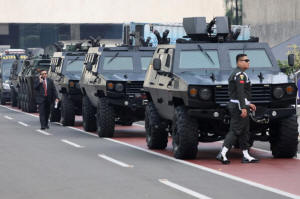|
Jokowi, as the president is popularly known, called attention to
his success building roads, bridges and ports across the world's
largest archipelago.
"We have been able to build a new foundation and civilization...
building from the peripheries, building from villages, and
building from outermost areas," he told the nation's parliament.
To date, his government has built 2,700 kilometers of new toll
roads, 50 new ports and airports, and 1.1 million hectares of
irrigation canals, he said.
The outgoing president, a former successful furniture
businessman from Java, also highlighted Indonesia's economic
record, pointing to a consistent growth rate of 5%, despite
global economic headwinds.
Home to more than 270 million people, Jokowi said the lowering
of extreme poverty from 6.1% to under 1%, the introduction of
the national healthcare system, and the criminal code overhaul
were notable successes.
The Indonesian president leaves office with a strong economic
record, but is facing mounting criticism about other aspects of
his legacy, including the weakening of the judiciary and
anti-corruption body and attempts to nurture his own political
dynasty.
Last October, the Constitutional Court, then headed by Jokowi's
brother-in-law, amended the age requirement of candidates,
paving the way for Jokowi's eldest son Gibran Rakabuming Raka,
36, to contest and win the vice presidency.
Gibran, alongside president-elect Prabowo Subianto, will be
inaugurated on Oct. 20.
Prabowo, an ex-commander once banned from entering the U.S. on
account of his alleged human rights record, won the February
elections with the help of Jokowi's influential backing.
Closing his speech on Friday Jokowi apologized to people in the
world's third-largest democracy for any shortcomings during his
tenure.
"Ten years is not a long period to solve all problems in our
nation," he said.
"It is very possible that I have committed a lot of mistakes."
(Editing by Shri Navaratnam)
[© 2024 Thomson Reuters. All
rights reserved.]
Copyright 2022 Reuters. All rights reserved. This material may
not be published, broadcast, rewritten or redistributed.
Thompson Reuters is solely responsible for this content.

|
|




